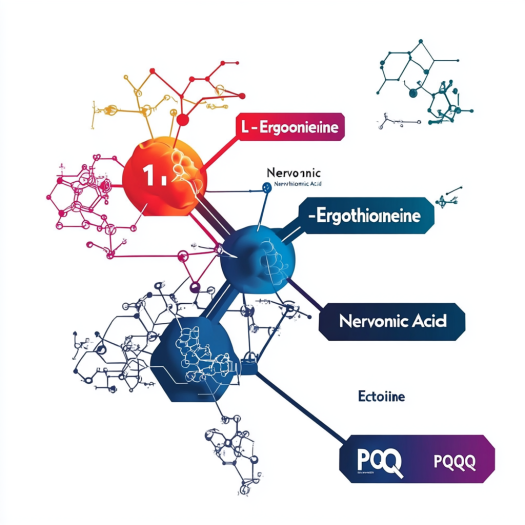
I’ve been hearing a lot about nervonic acid recently, especially from supplement makers targeting brain health, and it got me curious about why it’s gaining popularity.
Nervonic acid supports the health and regeneration of myelin—the protective sheath around your nerves—helping improve cognitive function, memory, and nerve conduction. Derived naturally, it’s becoming popular in dietary supplements aiming at supporting cognitive health, managing neurological conditions, and promoting overall nerve health and function, especially among aging populations or individuals facing cognitive decline.
But like many, I wondered—how exactly does it work, and should I consider recommending it in formulations for brain health products?
What Exactly is Nervonic Acid, and Why Does It Matter?
If you’re new to nervonic acid, you’re not alone. Many people still haven’t discovered its benefits, despite its promising effects on brain health.
Nervonic acid is a long-chain omega-9 fatty acid critical for synthesizing myelin, the protective coating around nerves. Myelin acts like insulation for nerve fibers, ensuring signals transmit quickly and effectively. Supplementing with nervonic acid can help repair, regenerate, and protect myelin, improving cognitive performance, nerve function, and overall brain health.

Understanding Nervonic Acid in Depth
Nervonic acid, also known as cis-15-tetracosenoic acid, isn’t just another fatty acid. It’s a specialized omega-9 fatty acid, naturally abundant in certain plant seeds like Acer truncatum and Lunaria oil. But why does this matter for you as a formulator or ingredient buyer?
It comes down to its critical role in synthesizing myelin1—the protective sheath around nerve fibers. Think of myelin as insulation around electrical wiring in your house. Without proper insulation, electricity doesn’t flow effectively, and circuits malfunction. Similarly, without healthy myelin, nerve signals slow down, causing cognitive decline, reduced mental clarity, and impaired nervous system functions.
Here’s a quick summary of nervonic acid’s key attributes:
| Attribute | Details |
|---|---|
| Chemical Name | cis-15-Tetracosenoic acid (24:1) |
| Natural Sources | Plant oils like Lunaria oil, Acer truncatum seed |
| Health Benefits | Cognitive support, nerve regeneration, anti-aging |
| Typical Applications | Dietary supplements, functional foods, pharma |
| Purity Standards | ≥90%, typically >95% |
It’s no wonder supplement brands globally are formulating with nervonic acid to target consumers looking for enhanced memory, sharper focus, and better overall nerve health.
How Does Nervonic Acid Actually Support Myelin?
I’ve always been fascinated by how natural ingredients interact with our bodies, especially something as specific as nervonic acid. But what is its actual role?
Nervonic acid directly contributes to myelin synthesis by being a key building block for the biosynthesis of sphingomyelin, a crucial myelin component. It helps repair and regenerate damaged nerve tissues, supports nerve signal transmission, and maintains structural integrity of myelin sheaths, thus significantly benefiting brain health and neurological function.
The Science Behind Myelin Restoration
To dive deeper, let’s consider the biology. Myelin, the protective sheath surrounding nerve fibers, is largely composed of lipids, among which nervonic acid is a critical constituent. When myelin is damaged—due to aging, nutritional deficiencies, diseases, or oxidative stress—the nervous system’s efficiency declines, leading to cognitive impairment, fatigue, and neurological disorders like multiple sclerosis and Alzheimer’s disease.
Nervonic acid serves as a crucial building block for repairing this damaged myelin. Clinical research shows supplementing with nervonic acid can stimulate oligodendrocytes2—the cells responsible for creating myelin—to increase their activity, speeding up the regeneration and repair of nerve sheaths. As a result, nerve signals travel faster and more efficiently, improving memory, cognitive function, and overall nerve health.
Notably, this myelin restoration process isn’t limited to aging individuals. It’s also beneficial for young adults or even athletes seeking cognitive enhancement and improved reaction times.
Who Can Benefit Most from Nervonic Acid Supplementation?
If you’re considering adding nervonic acid to your products, it helps to clearly understand your target audience. Who benefits the most from nervonic acid?
The primary beneficiaries of nervonic acid supplements include older adults experiencing cognitive decline, individuals recovering from nerve damage or neurological disorders, professionals seeking enhanced focus, and students aiming for improved memory and cognitive function. Anyone looking to maintain healthy brain function long-term could benefit from nervonic acid supplementation.
Key Customer Segments & Benefits
To illustrate this more clearly, here’s a quick overview:
| Audience | How They Benefit from Nervonic Acid |
|---|---|
| Seniors (50+) | Improved memory, reduced cognitive decline |
| Nerve Health Patients | Accelerated nerve repair, reduced neuropathy symptoms |
| Students | Improved memory, concentration, learning ability |
| Professionals | Enhanced focus, cognitive clarity, productivity |
Clearly, nervonic acid isn’t just for one narrow demographic—it has broad appeal across many consumer segments.
How Much Nervonic Acid Should I Include in My Supplements?
When formulating dietary supplements, dosage is everything. How much nervonic acid should you include for optimal benefits?
The recommended daily dosage of nervonic acid typically ranges between 100-300 mg per day, depending on targeted health benefits. Most formulations for cognitive enhancement or nerve regeneration typically include around 150-300 mg per serving. Always ensure raw materials meet purity requirements (≥95%) for maximum effectiveness.
Dosage Considerations for Formulators
When planning your formulation, remember, dosing isn’t one-size-fits-all. Consider your audience’s needs and regulatory standards carefully. Here’s a handy reference table:
| Application | Recommended Dosage per Serving |
|---|---|
| Cognitive health support | 100-200 mg daily |
| Nerve repair & regeneration | 200-300 mg daily |
| General brain maintenance | 100-150 mg daily |
Quality is also critical. At Santa Biotech, for instance, we consistently achieve purity levels above 95% through advanced fermentation technology, ensuring optimal bioavailability for end consumers.
Why Choose Fermentation-based Nervonic Acid?
If you’re considering adding nervonic acid to your supplements, functional foods, or pharmaceutical products, you’ll face a key decision: fermentation-based or chemical extraction? What’s the difference, and why should you care?
Fermentation-based nervonic acid offers higher purity, improved bioavailability, and a cleaner, solvent-free profile compared to chemically synthesized sources. It’s environmentally sustainable, free from harmful solvents, and aligns with global standards, making it the preferred choice for premium dietary supplements, health products, and pharmaceutical formulations.

Advantages of Fermentation Production Method
Fermentation isn’t just trendy—it’s fundamentally better. Here’s why:
- Cleaner and Safer: No harsh chemical solvents mean zero residual impurities, significantly reducing potential side effects or allergic reactions.
- Higher Bioavailability: Fermentation yields nervonic acid with higher purity, enhancing absorption and effectiveness.
- Sustainable and Environmentally Friendly: It’s more eco-friendly than chemical extraction, producing less waste and consuming fewer resources.
Let’s compare briefly:
| Production Method | Purity Level | Solvent Residue | Sustainability |
|---|---|---|---|
| Fermentation-based | ≥95% | None | High |
| Chemical Synthesis | ~85-90% | Possible | Low |
When formulating premium health supplements, fermentation-based nervonic acid3 clearly stands out, offering cleaner, safer, and more bioavailable results.
To be honest, seeing this difference helped me understand why Santa Biotech focuses exclusively on fermentation-produced ingredients—it’s simply the best way to guarantee consistent, premium quality for our B2B clients worldwide.
Conclusion
Nervonic acid is a powerful, science-backed choice for supporting myelin health—perfect for next-generation cognitive and nerve health supplements.
-
Understanding the process of myelin synthesis is crucial for anyone interested in neurological health and its implications for cognitive performance. ↩
-
Discover the essential functions of oligodendrocytes in myelin repair and their impact on neurological health by exploring this informative link. ↩
-
Explore this link to understand how fermentation-based nervonic acid enhances the quality and effectiveness of health supplements. ↩

